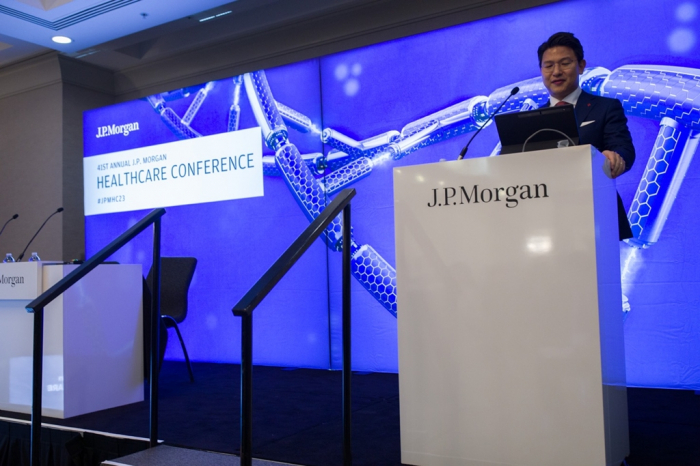Bio & Pharma
Lotte to invest more in US bio biz, spend $3 bn in Korea
Lotte Biologics plans to raise money for South Korean investment through IPO and other fundraising efforts
By Jan 11, 2023 (Gmt+09:00)
3
Min read
Most Read
LG Chem to sell water filter business to Glenwood PE for $692 million


Kyobo Life poised to buy Japan’s SBI Group-owned savings bank


KT&G eyes overseas M&A after rejecting activist fund's offer


StockX in merger talks with Naver’s online reseller Kream


Mirae Asset to be named Korea Post’s core real estate fund operator



SAN FRANCISCO -- South Korea’s Lotte Biologics Co. is considering investing more in the US bio industry and spending $3 billion in new factories at home as it aims to report an operating margin of 35% by 2030 through global market expansion.
“Through two strategies of acquisitions and construction of new facilities, we will establish ourselves in the CDMO market and strengthen our business competitiveness,” said Lotte Biologics CEO Richard Lee at the JP Morgan Healthcare Conference on Tuesday in San Francisco, referring to the contract development and manufacturing organization sector.
In May 2022, Lotte Group, South Korea’s fifth-largest conglomerate, said it agreed to buy Bristol Myers Squibb's (BMS) biologics plant in Syracuse, New York for $160 million as a step toward the bio industry.
Lotte Biologics, the group’s bio unit, aims to accelerate its expansion in the North American market through the acquisition.
EXPANSION IN THE US, SOUTH KOREA
The company is considering additional takeovers of facilities for drug products and clinical materials and contract production of antibody-drug conjugates (ADC) to foster the factory in Syracuse as its North American center, Lee said.
“We aim to turn the plant in Syracuse into the best ADC-specialized contract production service center in North America,” Lee said.
Lotte Biologics is also mulling measures to expand its bases in North America by establishing contract manufacturing organization facilities in major cities such as Boston and San Francisco, he said.
In South Korea, Lotte Biologics, founded in June 2022, plans to spend $3 billion to build three antibody drug factories with an annual capacity of 120,000 liters each by 2030. It is set to raise the money with an initial public offering and other fundraising measures.
The company is scheduled to break ground for the first plant in the second half, complete construction by the second half of 2025 and win Good Manufacturing Practices approval to produce drugs a year later with a target of commercial production in 2027, Lee said.
With the plants, Lotte Biologics aims to log sales of $3 billion for an operating margin of 35% by 2030.
SAMSUNG BIOEPIS
Separately, Samsung Bioepis Co. unveiled a blueprint for the development of new drugs based on microorganism incubation.
The biopharmaceutical unit of South Korea’s top conglomerate Samsung Group is the world’s only company that produces the biosimilars of both Lucentis and Eylea, treatments for macular degeneration. Most companies focus on Eylea’s biosimilars as Eylea has three times the market and has more indications than Lucentis.
Biosimilars of Eylea are based on animal cells, while those of Lucentis are based on microorganisms.
Samsung Bioepis is set to use the microorganism technology for the development of new drugs, President and CEO Ko Hansung said.
“The technology accumulated through the production of the Lucentis biosimilar will lead to the development of new drugs,” Ko told The Korea Economic Daily.
Microorganism incubation is considered a promising technology as it is necessary to produce double-antibody and raw materials for ADC.
“It is an ultimate key to secure the technology to incubate microorganisms and produce proteins,” Ko said. “We have had discussions with various companies that handle microbial platforms at this conference.”
Write to Jeong Min Nam at peux@hankyung.com
Jongwoo Cheon edited this article.
More to Read
-
 Mergers & AcquisitionsLotte to buy BMS' biologics plant in Syracuse for $160 mn
Mergers & AcquisitionsLotte to buy BMS' biologics plant in Syracuse for $160 mnMay 13, 2022 (Gmt+09:00)
3 Min read -
 BiosimilarsSamsung Bioepis gets FDA approval for Lucentis biosimilar Byooviz
BiosimilarsSamsung Bioepis gets FDA approval for Lucentis biosimilar ByoovizSep 23, 2021 (Gmt+09:00)
3 Min read
Comment 0
LOG IN


